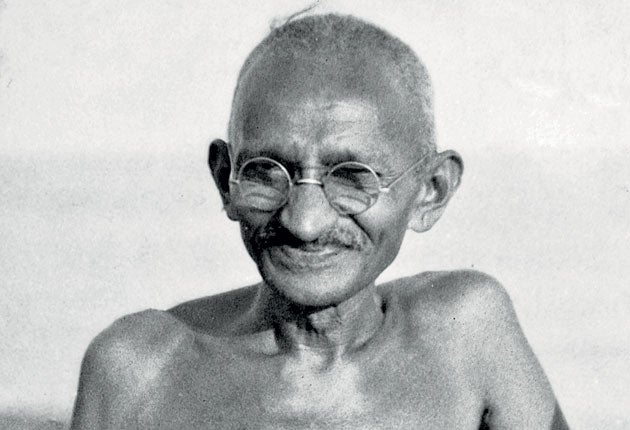India ponders new law after book questions Gandhi's sex life

The authorities in India are considering making it a criminal offence to insult Mahatma Gandhi after a new biography sparked fresh speculation about his sexual preferences and suggested he once made racist comments.
The Minister of Law and Justice, Moodbidri Veerappa Moily, told reporters yesterday that he was reviewing legislation in order to protect the reputation of a man considered a national icon. "Mahatma Gandhi is revered by millions, not just in India but across the world," he said.
"We can't allow anybody to draw adverse inferences about historical figures and denigrate them. Otherwise history will not forgive us."
The move comes a day after the authorities in the state of Gujarat, where Gandhi lived for a number of years, announced they would ban the book, Great Soul: Mahatma Gandhi and His Struggle with India, written by Pulitzer-prize winning journalist Joseph Lelyveld. "The writer has indulged in the most reprehensible act," claimed the state's chief minister.
Controversies over the man who led the struggle against British rule regularly crop up. Last year the pen and watch maker Mont Blanc was forced to withdraw a £16,000 gold ink pen released to mark the anniversary of his birth that after it was deemed an ostentatious insult to his frugal example.
But the row over Lelyveld's book is one of the oddest. Much of the controversy focuses on reviews of the biography, currently not available in India, and which the author claims are inaccurate.
Among the reviews which created the storm was one by British historian Andrew Roberts, writing in the Wall Street Journal, in which he claimed the biography portrayed the independence leader as "a sexual weirdo, a political incompetent and a fanatical faddist". Other reviews focused on Gandhi's relationship with a German-Jewish architect and amateur body-builder, Hermann Kallenbach, who lived with Gandhi in South Africa for several years in the early 1900s.
The reviews suggest Lelyveld's book concludes that the "Great Soul" was bisexual and highlights sections which detail Gandhi's habit of sleeping naked with his 17-year-old niece in order to test his control over his carnal urges.
However, other reviewers found Lelyveld's book much less sensational and the author issued a statement in which he said: "I do not allege that Gandhi is racist or bisexual. The word 'racist' is used once to characterise comments by Gandhi early in his stay in South Africa... the chapter in no way concludes that he was a racist or offers any suggestion of it." The Law Minister said officials were looking at amending the National Honour Act of 1971, which protects the Indian constitution and its flag. But the decision, first reported by the Indian Express, has been the basis for sharp debate about whether such a move would undermine freedom of expression.
Among those who have opposed an amendment is Tushar Gandhi, a great grandson of the independence leader. Last night, Mr Gandhi told The Independent: "I strongly feel that no book or opinion should be censored. They should be, and can be, countered, but they should not be gagged. It goes against our constitutional guarantee of freedom of speech and threatens the freedom of the individual."
Although Gandhi is held in high regard for his crucial role in leading the peaceful struggle to win independence, some of his beliefs and actions have been questioned by academics and historians, in particular his views on caste. In his review, Roberts recalls that BR Ambedkar, a contemporary of Gandhi and who spoke out on behalf of the country's Dalits or Untouchables, described Gandhi as "devious and untrustworthy".
Join our commenting forum
Join thought-provoking conversations, follow other Independent readers and see their replies
Comments
Bookmark popover
Removed from bookmarks